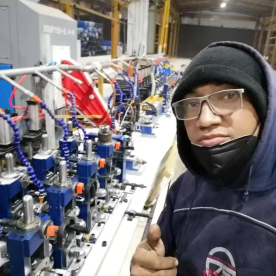[Industrial Solid state HF welder]Exploring the Benefits and Applications of Industrial Solid State HF Welder Technology in Modern Manufacturing Processes
News 2024-8-12
In the fast-paced world of modern manufacturing, efficiency, precision, and reliability are paramount. The need for high-quality bonding processes has led to significant advancements in welding technologies, with one of the most notable innovations being the Industrial Solid State High Frequency (HF) welder. These machines harness the power of solid-state electronics to provide a reliable and effective welding solution, paving the way for a myriad of applications across various industries. This article delves into the significance of industrial solid-state HF welders, their benefits, applications, and the future of welding technology.

Exploring the Benefits and Applications of Industrial Solid State HF Welder Technology in Modern Manufacturing Processes
One of the primary advantages of industrial solid-state HF welders is their efficiency. These systems utilize advanced solid-state components that drastically reduce power consumption compared to older tube-based machines. The result is a more environmentally friendly operation, offering manufacturers a sustainable welding solution. This energy efficiency is complemented by lower operating costs, as fewer resources are needed to achieve the same output quality.

Exploring the Benefits and Applications of Industrial Solid State HF Welder Technology in Modern Manufacturing Processes

Exploring the Benefits and Applications of Industrial Solid State HF Welder Technology in Modern Manufacturing Processes
In addition to traditional applications, the growing trend of automation in manufacturing has allowed solid-state HF welders to seamlessly integrate into production lines. Automated systems equipped with these welders can perform high-speed welding operations, maximizing throughput while minimizing human error. The synergy between automation and solid-state technology has opened new avenues for innovation, enabling the production of intricate and complex assemblies with unprecedented speed.
As industries push toward smart manufacturing and Industry 4.0, the role of industrial solid-state HF welders continues to evolve. These machines are increasingly being incorporated into data-driven ecosystems that monitor performance, analyze quality metrics, and predict maintenance needs. This level of integration enhances overall operational efficiency and reduces downtime, which is vital in manufacturing environments where time-to-market is critical.
While the advantages of these welders are evident, they do require an initial investment that may deter some manufacturers. However, the long-term savings from reduced energy consumption, lower upkeep, and improved weld quality typically outweigh these costs, making solid-state HF welders a worthwhile investment.
In conclusion, industrial solid-state HF welders represent a significant advancement in welding technology, offering numerous benefits that cater to the evolving needs of modern manufacturing. From their energy efficiency and precision to their ability to integrate into automated systems, they provide a multifaceted solution for various industrial applications. As industries continue to innovate and adopt smart manufacturing practices, solid-state HF welding technology is poised to play an increasingly critical role in shaping the future of industrial bonding processes. As firms embrace this technology, they can expect not only to enhance productivity but also to maintain a competitive edge in a rapidly advancing marketplace.
